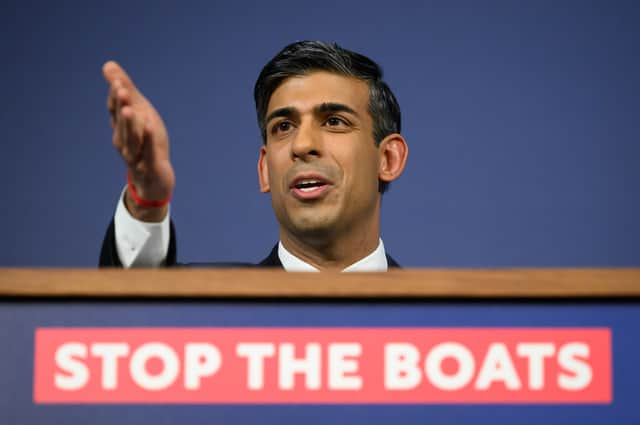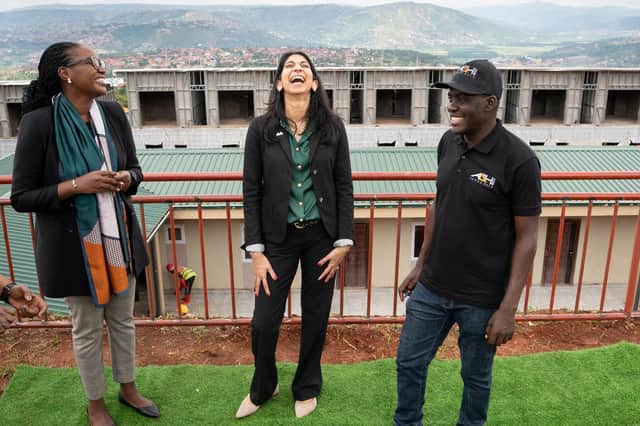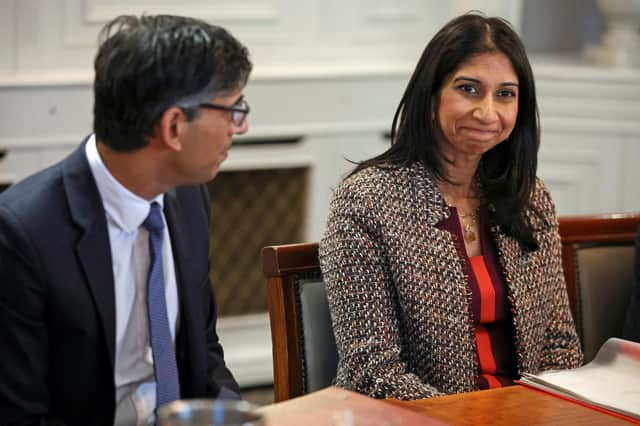Supreme Court Rwanda ruling: why was it unlawful? What does decision mean for Rishi Sunak - what happens next
and live on Freeview channel 276
In what has been described as a “landmark judgement”, the Supreme Court ruled that the government’s scheme to send asylum seekers to Rwanda is unlawful.
The five justices - who form the highest court in the land - said they were concerned that genuine asylum seekers were at risk of being returned to their home countries, where they would potentially be in danger, which is known as “refoulement”. The Supreme Court said this was unlawful under several international treaties that the UK has signed, and also goes against domestic law.
Advertisement
Hide AdAdvertisement
Hide AdThe ruling is a huge blow to Rishi Sunak, who promised to “stop the boats” as one of his five pledges. This policy, which he claims will deter illegal migrants from making the journey to the UK, was the cornerstone of this promise. The Prime Minister has seen anger from his backbenches, with six Tory MPs reportedly submitting letters of no confidence in him.
Sunak has revealed the UK government is working on a new treaty with Rwanda, which he believes will be lawful. The government believes this will solve the issue of refoulement, and the text could be revealed next week.
The government will also bring in emergency legislation which Sunak's spokesman said would prevent "systematic legal challenges", such as those brought by charities and campaign groups. However it is now more than 18 months since this idea was first brought forward by Priti Patel, £140 million has been spent and still no flights have taken off.
This ruling could have huge implications for the UK government's policy, the future of the Prime Minister and the next election.


What is the Rwanda policy?
Advertisement
Hide AdAdvertisement
Hide AdThe Rwanda policy was a key part of the government’s Illegal Migration Act, which would see asylum seekers deported to the east African country for processing and resettlement. It was first conceived by Boris Johnson and Priti Patel in April 2022, and the first flights were due to take off at the end of May - however this was blocked by a legal challenge.
Since then £140 million has been spent on the partnership with Rwanda, which NationalWorld understands cannot be recouped even if the plan is never deemed lawful. The government has said it believes that Rwanda is a safe country, while claiming that the scheme will also act as a deterrent against illegal migrants.
Charities such as the British Red Cross have refuted the Home Office’s claims that the policy will succeed in stopping Channel crossings, arguing that “deterrence policies don’t work and will never solve the asylum seeker crisis”.
In June, Court of Appeal judges overturned a previous High Court ruling that said the nation in east Africa could be considered a “safe third country”. Lord Chief Justice Lord Burnett said “deficiencies” in the asylum system in Rwanda mean there is a “real risk” that asylum seekers deported there would be “returned to their home countries”, where they could face “persecution” - even if they have a legitimate claim. That ruling led to today's Supreme Court judgement.


What did the Supreme Court ruling say?
Advertisement
Hide AdAdvertisement
Hide AdThe five justices on the Supreme Court upheld the Court of Appeal’s ruling that the policy was unlawful. Lord Reed, the President of the Supreme Court, said there were "substantial grounds for believing asylum seekers sent to Rwanda would be at real risk of refoulement".
He said: "The Court of Appeal concluded there were such grounds, we are unanimously of the view they were entitled to reach that conclusion." He confirmed the Supreme Court thought there was a "substantial risk of refoulement" and said "a change is needed" for the policy to be legal.
The Home Office's case was that a "memorandum of understanding has been entered into between the UK and Rwandan governments" which, despite having no legal obligation, stated that asylum seekers would not be returned to their home countries.
However, a key part of the evidence came from the United Nations High Commissioner For Refugees, the UN's refugee agency, which found that Israel had entered a similar agreement with Rwanda, and "asylum seekers were routinely moved to a neighbouring country where they were likely to be refouled".
Advertisement
Hide AdAdvertisement
Hide AdIn their ruling, which the other justices agreed with, Lords Reed and Lloyd-Jones said Rwanda’s history “cannot be effectively ignored or sidelined” as suggested. They said there was “no dispute” that the Rwandan government entered into its deal with the UK “in good faith”, with strong incentives to follow the terms of the arrangement.
Lords Reed and Lloyd-Jones continued: “Nevertheless, intentions and aspirations do not necessarily correspond to reality: the question is whether they are achievable in practice. The central issue in the present case is therefore not the good faith of the government of Rwanda at the political level, but its practical ability to fulfil its assurances, at least in the short term, in the light of the present deficiencies of the Rwandan asylum system.”
The Supreme Court justices later said there was “evidence of a culture within Rwanda of, at best, inadequate understanding of Rwanda’s obligations under the Refugee Convention”.


What happens next?
Rishi Sunak revealed at Prime Minister’s Questions that the government was working on a new treaty with Rwanda, that he believes will be lawful. “There are further elements that they want additional certainty on and noted that changes can be delivered in the future to address those issues,” Sunak said.
Advertisement
Hide AdAdvertisement
Hide Ad“The government has been working already on a new treaty with Rwanda and we will finalise that in light of today’s judgement.” NationalWorld understands that the treaty would have a refoulement clause in it, which would require refugees to stay in Rwanda under some sort of settled status even if their claims are rejected.
Sunak's spokesman told reporters that the “vast majority” of people sent to Rwanda would stay there but there may be exceptional cases sent back to the UK.
“There would be a small minority of cases … where the UK is legally obliged to facilitate the return of an individual,” he said. “But that would be in a very specific legal cases.” The spokesman added: “In the vast majority of cases, they would remain in Rwanda, that would be what you will see.”
Given the Supreme Court questioned Rwanda’s “practical ability to fulfil its assurances”, it remains to be seen whether this would satisfy them. The Home Office had experts in Rwanda last week, and has been providing training and supporting recruitment for the last 15 months.
Advertisement
Hide AdAdvertisement
Hide AdNationalWorld understands some principles of the treaty have been agreed, however further legal checks are required. Explaining the process for a new deal, the Prime Minister’s official spokesman said: “My understanding is that once the treaty has been laid in Parliament, the government cannot ratify it for 21 sitting days.
“If Parliament objects during that time by agreeing a motion on the floor of the House, there will be a further 21 sitting days before ratification.” The text of the treaty could be made public next week.
Sunak has also announced he will bring in emergency legislation to try and block legal challenges to the flights. He said this would "ensure that people cannot further delay flights by bringing further systemic challenges in our domestic courts and stop our policy being repeatedly blocked". This will be primary legislation, so it will undergo the full scrutiny process of the Commons and the Lords, and the government believes this will prevent “systemic challenges” to the policy.
“The approach we have seen where people challenge the principle of our Rwanda policy, that will be dealt with through the emergency legislation,” the Prime Minister’s official spokesman explained.
Advertisement
Hide AdAdvertisement
Hide Ad“We think this is the fastest route through to getting flights in the air. We think by closing off these avenues of challenge it will help speed through the process.” It is thought refugees who are being flown to Rwanda may be able to bring individual legal cases.
Sunak also threatened to change domestic law - which would include the Human Rights Act - and look at UK’s membership of international treaties, if the policy was still declared unlawful.
He told the House of Commons: “If it becomes clear that our domestic legal frameworks or international conventions are still frustrating the plans at that point, I am prepared to change our laws and revisit those international relationships. The British people expect us to do whatever it takes to stop the boats and that is precisely what this government will deliver.”
This could include the European Convention on Human Rights (ECHR), the UN Refugee Convention and the UN’s convention against torture. On the ECHR, which underpins the Good Friday Agreement, Sunak said: "I will not allow a foreign court to block these flights. If the Strasbourg court chooses to intervene against the express wishes of Parliament I’m prepared to do what is necessary to get flights off." The Law Society said that if the UK left the ECHR it would become a pariah. President Lubna Shuja said: “Leaving the ECHR would mean the UK would sit as an outlier in Europe, alongside only Russia and Belarus, who are already outside the convention.”
Advertisement
Hide AdAdvertisement
Hide AdImmigration barrister Colin Yeo told BBC Radio 5 Live: “It’s not just an unusual legal rule, it’s actually deeply embedded in the international treaty system. It’s making it quite hard for the government to go behind that … the government would have to withdraw from the whole treaty system essentially in order to go ahead with that.
“A lot of us would say if you want to withdraw from these treaties and make yourself an international pariah in order to then send people into a situation where they’re going to be seriously harmed, you really ought to think about whether that’s the right thing to do.”
While Sile Reynolds, head of asylum advocacy at Freedom from Torture, told NationalWorld: “The threats being made by the government now to turn its back on from vital international human rights agreements is an attack on the rights that protect us all.
“This move will only further demonstrate the divisiveness of the politics of hate that has characterised this Government’s approach to refugee protection. It won’t sort out the enormous backlog in which so many of our clients – torture survivors who’ve fled the most unimaginable horrors – are languishing, unable to recover and rebuild their lives.”
What does this mean for Rishi Sunak?
Advertisement
Hide AdAdvertisement
Hide AdThe Prime Minister is under severe pressure following this ruling both from the opposition and his own MPs. Sunak has made “stopping the boats” one of his five pledges at the start of the year, and asked to be held accountable.
Sunak has framed the Rwanda scheme as the key plank of this policy. Even though experts have questioned how effective it will actually be, its failure so far is a bad look for the government and the Prime Minister.
The asylum backlog is currently at record levels - with a total of 175,457 people waiting for an initial decision on an asylum application at the end of June, up 44% from the previous year. The Home Office’s spending on asylum has almost reached £4 billion, eight times the amount a decade ago, and this is a problem Sunak is struggling to solve.
He won’t be able to recoup the £140 million paid to Rwanda, as that was part of a linked economic partnership, and Labour has described the policy as “unworkable and exorbitantly expensive”. However, bigger problems are coming from his own party.
Advertisement
Hide AdAdvertisement
Hide AdSuella Braverman has already indicated her willingness to attack the Prime Minister over this, writing in a letter last night which accused Sunak of betraying promises to her and the British people over immigration.
Former minister Dame Andrea Jenkyns has claimed that around half a dozen MPs are submitting letters of no confidence in Sunak today. While Simon Clarke told Sky News that Sunak’s response to the ruling was a "confidence issue in his judgement as Prime Minister and leader of the Conservative Party”.
And deputy Tory party chairman Lee Anderson said the government should “ignore the laws” and “put planes in the air anyway”. Justice Secretary Alex Chalk was forced to tweet out: “Respecting the rule of law means respecting the impartial judgments of our independent courts. Judges apply the law without fear or favour - a longstanding principle of our democratic constitution.”
There is virtually no chance that Sunak will be replaced as leader before the next election, as most Tory MPs understand this would damage their chances even further. However there is a risk that the Prime Minister could be dragged into party political battles, instead of focusing on governing and attacking the Labour party.
Advertisement
Hide AdAdvertisement
Hide AdToday (15 November) almost all the focus in Westminster has been on the failure of the Rwanda plan, as opposed to internal divisions within Labour over Gaza and Israel. It appears unlikely Sunak will get planes in the air any time soon.
Comment Guidelines
National World encourages reader discussion on our stories. User feedback, insights and back-and-forth exchanges add a rich layer of context to reporting. Please review our Community Guidelines before commenting.
